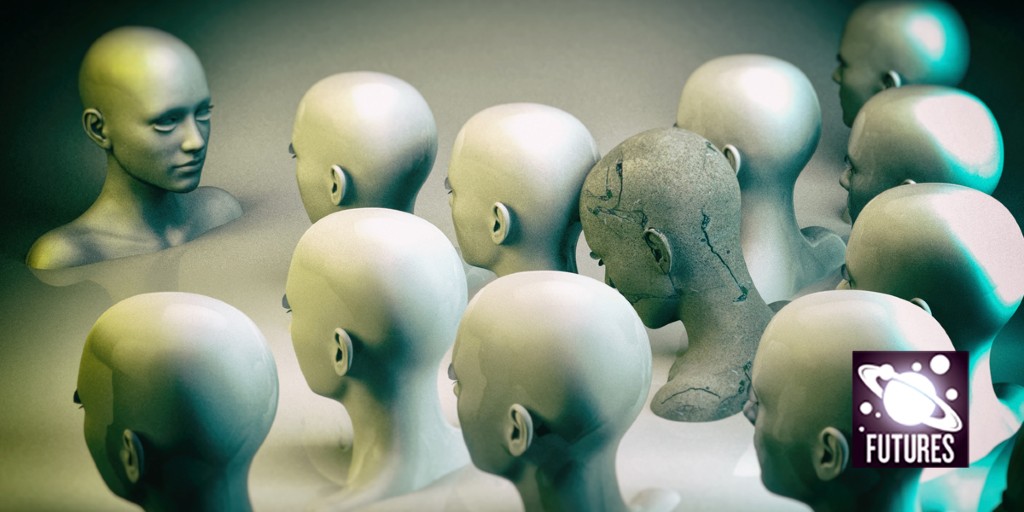I waited for myself in the diner. The coffee was synthetic crap that looked like tar and tasted worse, but there was little else to occupy myself with as my netlink was malfunctioning again. Well, there was the view: cargo ships nudged into dock, the glittering expanse of space stretching out behind them. The blinking lights and slow-crawl movement of the station’s docking bay looked far more inviting than this retro diner with its faux-vinyl upholstery and chequered flooring.
The dock marshals and their illuminated beacons had so fully captured my attention that I didn’t notice my other self arrive; she slid into the booth across from me as if she’d always been there, on my periphery, and had only now come into focus.
We stared at each other for a moment. She looked tired, almost gaunt under the brilliant fluorescent lights of the diner. A wax-like quality to her skin. Grey bruising under her eyes. Her mouth was pinched, as if she held all her tension behind closed lips. The familiar face I saw in the mirror each morning had been worn down by a life I hadn’t lived.
“You got my message,” she said.
I nodded and set down my coffee. “It’s been a few years.”
“Sure has.”
She folded and unfolded her hands on the laminated table-top. Rubbed a calloused thumb along her knuckles. I resisted the urge to look down at my own hands, to compare our scars and picked-clean cuticles. “Well,” she said finally, reaching inside her coveralls and withdrawing a white envelope.
“Well,” she said again. “I need a favour.” Then she slid the envelope across the table towards me.
I picked it up slowly. Thoughts rattled around my head but I couldn’t figure out what type of favour this might be. Money? No — she’d been working the rigs for years and had to be rolling in dough. Unless she’d gambled it all away. I flicked a glance at her haggard face, noting the yellow undertone of her skin. Drugs?
When I finally got the letter out and began to read, I recoiled at my previous unkind speculation even as disbelief pinned me in place. Skimming to the bottom of the page, my attention came to rest on the two signature lines. One had already been filled in.
I looked up at her in shock.
She shrugged. “Just as you brought me into this world, seems that I need your permission to leave it.”
A sour lump rose in my throat. I looked down at the letter again. The printed words blurred, then sharpened into focus once more as I blinked, my eyes suddenly hot with burgeoning emotion. “Physician aid-in-dying?”
“I’m sick. Don’t tell me it’s not obvious,” she said, gesturing at herself. “Apparently organ failure’s common in clones.”
I vaguely recalled a mention of side effects when I’d filled out the paperwork 30-odd years ago. How eager I’d been to create a new life who could help me work off my debt. How young and naive.
“I’m sorry,” I told her. “I should’ve …”
When I couldn’t produce the words, she smiled, sad and fleeting. “It’s OK.”
It wasn’t. But it was the closest thing to forgiveness I would ever get. Maybe, in the years to come, it would be enough to assuage some of the guilt I knew I’d carry with me.
Taking the pen from my shirt pocket, I signed on the line where it said ORIGIN DNA. Our signatures, I noticed, were completely unlike.
“Thank you,” she said, slipping the letter back inside her coveralls.
We sat in silence. All the things I thought to say were trivial in comparison with what I had just signed, so I said nothing. We hadn’t needed to meet in person for this; she could have easily sent me the file and had my digital signature in minutes. She had her reasons, though. I could see it in the set of her jaw. Around us, life continued: the door to the diner opened, admitting a group of people whose conversation and laughter filled the room like expanding foam sealant; beyond the pressure-glass window, the blackness of space waited at our fingertips, the dock marshals directing ships into bay with calm precision. Finally, my other self nodded and rose from her seat.
“I won’t see you again, will I?” I said, looking up at her.
“Probably not.”
Part of me wanted to ask about her family — if she had one, if they had the means to survive once she was gone. But I could tell from the cool look in her eyes that it wasn’t my place to ask. I’d brought her into the world for selfish reasons. She owed me nothing at all.
Would I see it any differently, if it were me?
The door to the diner slid closed behind her, leaving me with a cold cup of coffee and a hollow feeling in my chest. If I’d been a braver woman, I might have asked if she’d been happy, if she’d had a good life. If it had been worth it.
And if I’d been braver still, I might have asked that question of myself.






More News
I study artefacts left in prehistoric caves
How artificial intelligence is helping to identify global inequalities
Tackling ‘wicked’ problems calls for engineers with social responsibility